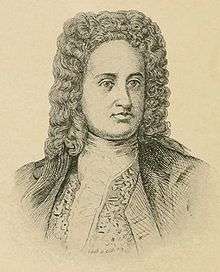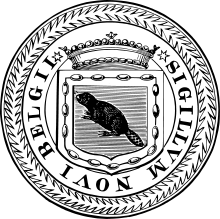Jeremias van Rensselaer
| Jeremias Van Rensselaer | |
|---|---|
 Portrait of Jeremias Van Rensselaer | |
| Born |
16 May 1632 Amsterdam, Netherlands |
| Died |
October 14, 1674 Manor of Rensselaerswyck, New York |
| Nationality | Dutch |
| Occupation | merchant, patroon |
| Known for | Third patroon of the Manor of Rensselaerswyck |
| Board member of | Dutch West India Company |
| Spouse(s) | Marritje Van Cortlandt |
| Parent(s) |
Kiliaen Van Rensselaer Anna Van Wely |
| Signature | |
 | |
| New Netherland series |
|---|
| Exploration |
| Fortifications: |
| Settlements: |
| The Patroon System |
|
| People of New Netherland |
| Flushing Remonstrance |
 |
| Rensselaerswyck series | |
|---|---|
| Dutch West India Company | |
| The Patroon System | |
| Map of Rensselaerswyck | |
| Patroons of Rensselaerswyck:
Kiliaen van Rensselaer | |
 |
Jeremias van Rensselaer (Amsterdam, 16 May 1632 [2] – October 12, 1674) was the third son of Kiliaen van Rensselaer and Director of the Manor of Rensselaerswyck.
Life
Jeremias was the second son of Kiliean's second wife, Anna van Wely. He grew up on Keizersgracht, and received a Calvinist education. In 1654 sailed from Amsterdam on the Gelderse Blom (Gelderland Flower), to New Netherlands.[3] He returned to Holland by the Beaver, Oct. 28, 1655, and sailed the second time from Amsterdam on the Gilded Otter, shortly after June 14, 1656.
Jan Baptist returned to Amsterdam in 1658 and Jeremias succeeded him as Director of Rensselaerwyck on September 24.[4] He was the first of his family to establish himself permanently in America, the remaining sixteen years of his life being devoted to the government of the colony.[5]
Pursuing the policies begun under the vice-directors, he became a man of great influence among the Indians, and "so attached them to him that they guarded his estates as carefully as they did their own."[6] To the French in Canada he was known as one of the representative and ablest men of the Dutch and English colonies. He had the good judgment to adjust the acute differences with Peter Stuyvesant which had troubled the administrations of his brother and van Slichtenhorst, and during the brief residue of the Dutch authority in New Netherland was on excellent terms with the governor.[5]
In 1661 eight chairs, a bed, a mirror and a cupboard were sent to him from the Dutch Republic.[7]
In 1664 Jan Baptist, Elisabeth van Twiller, the widow of Johan, Leonora and Susanna decided to sell all their property in and around Rensselaerswijck to Jeremias.[8] His younger brother Rijckert went to the colony to assist him.
On the occasion of the landtsdagh or diet summoned by Stuyvesant early in 1664 to deliberate on the critical condition of the province—this being the first general representative assembly held within the present state of New York—he served as presiding officer of that body.[5]
After the surrender to the English in September 1664, he took the oath to the new government, and the rights and immunities enjoyed by his family in its colony were recognized, though the precise future status of the property was not settled in his time. He desired to obtain a new patent in the name of his family, and, failing in this, was privately advised to move in the matter as an individual (being qualified to hold real estate by virtue of his British citizenship), and so obtained a regrant of Rensselarswyck in his personal name. This counsel he rejected indignantly, saying he was but a coheir, and would not defraud his brothers and sisters. He finally obtained from Governor Andros a patent "to the heirs of Kiliaen van Rensselaer," which, while in a sense only provisional, served all necessary purposes until the manor grant of 1685.[9]
Jeremias was succeeded as Director of Rensselaerwyck by his younger brother Nicholas.
Jeremias left a voluminous correspondence, together with a minute chronicle of events in America, under the title of the "New Netherland Mercury". His great industry and methodical habits have been remarked upon by many writers.[10]
Family
Jeremias married Maria van Cortland, daughter of Olaff Stevensz van Courtlant on July 12, 1662 [11][12] and had the following children with her.[10]
- 1. Kiliaen Van Rensselaer, second lord of Rensselaerswyck Manor.
- 2. Johannes van Rensselaer
- 3. Anna van Rensselaer, b. 1665 and married Kilaen Van Rensselaer, her first cousin.
- 4. Hendrick van Rensselaer
- 5. Maria van Rensselaer, married Peter Schuyler.
Jeremias died in Rensselaerswyck on October 12, 1674.[13]
References
- ↑ Spooner 1907, p.17
- ↑ Birth certificate Amsterdam City Archive
- ↑ Bielinski, Stefan. "Jeremias Van Rensselaer", New York State Museum
- ↑ Spooner, pp. 13-14
- 1 2 3 Spooner, pp. 14
- ↑ Wilson, James and Fiske, John. Appletons Cyclopaedia of American Biography Vol. 6, pp. 250-251, D. Appleton and Company, 1889
- ↑ Jacobs, J. (2005) New Netherland: a Dutch colony in seventeenth-century America, p. 411
- ↑ NA 2241, f. 1233-1234, not A. Lock, 13 June 1673.
- ↑ Spooner, pp. 14-15
- 1 2 Spooner, pp. 15
- ↑ Jacobs, J. (2005) New Netherland: a Dutch colony in seventeenth-century America, p. 429
- ↑ Hudson-Mohawk Genealogical and Family Memoirs, edited by Cuyler Reynolds, Vol.I, Lewis Historical Publishing Company, New York, 1911
- ↑ Jacobs, J. (2005) New Netherland: a Dutch colony in seventeenth-century America, p. 444
Bibliography
- Spooner, W. W. (January 1907). "The Van Rensselaer Family". American Historical Magazine 2 (1): 13–15.
- This article incorporates text from an article in American Historical Magazine, by W. W. Spooner (1907), a publication now in the public domain.
 Wilson, James Grant; Fiske, John, eds. (1900). "Van Rensselaer, Killian". Appletons' Cyclopædia of American Biography. New York: D. Appleton.
Wilson, James Grant; Fiske, John, eds. (1900). "Van Rensselaer, Killian". Appletons' Cyclopædia of American Biography. New York: D. Appleton.
| ||||||||||||||||||||||||||||||||||||||||||||||||||||||
